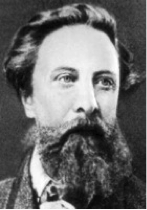 Count Aleksey Konstantinovich Tolstoy was one of the iconic Tolstoy family of 19th century Russia, a second cousin to the more famous Leo Tolstoy. He is more commonly known by the shortened form of A K Tolstoy and, like many of his kin, he was a playwright and novelist as well as being a poet. His historical dramatic works were so significant that he is considered by many students of Russian literature to be among the most important in his field. He also produced a number of satirical works, often using the pen name Kozma Prutkov.
Count Aleksey Konstantinovich Tolstoy was one of the iconic Tolstoy family of 19th century Russia, a second cousin to the more famous Leo Tolstoy. He is more commonly known by the shortened form of A K Tolstoy and, like many of his kin, he was a playwright and novelist as well as being a poet. His historical dramatic works were so significant that he is considered by many students of Russian literature to be among the most important in his field. He also produced a number of satirical works, often using the pen name Kozma Prutkov.
He was born on the 5th September 1817 in St Petersburg, the son of Count Konstantin Petrovich Tolstoy. Unfortunately Aleksey’s father soon left home and his mother was forced to take her infant son out of the city, firstly to her own estate in the Chernigov Governorate and then on to Krasny Rog which was her brother’s residence. Aleksey’s uncle took on the role of his first tutor and, with the aid of others, soon had his charge learning languages such as English, French and German. It was in these early days that A K began writing poetry which was quite remarkable for a boy of six years old. It was, in many ways, an idyllic childhood.
In 1826 he returned, with his mother and uncle, to St Petersburg where he found himself invited into court circles as an official “comrade in games” to the young Crown Prince, the boy who would become Tsar Alexander II. He enjoyed his time at the royal palace of Tsarskoye Selo and the two playmates grew up to be good friends for at least forty years. A K was overawed a year later when he was taken to Weimar in Germany and met Goethe and the great man certainly made a huge impression on him. This began a long period of travel and A K particularly fell in love with Italy which he soon began to regard as his “motherland”.
At the age of 18 A K took up a career with the Economic Affairs and Statistics Department in Saint Petersburg shortly after losing his beloved uncle and inheriting the Krasny Rog estate. His output of poetry was becoming more prominent and his work came to the attention of Vasily Zhukovsky and Pushkin, who both gave him their approval and support. He had no ambitions to have his work published at this stage though.
His first forays into the world of publishing were in the form of gothic, sometimes macabre, stories. There were two novellas called Vurdalak”s Family and Three Hundred Years On followed by a “horrific, political satire called The Vampire. He changed direction though when, in 1851, he fell in love with and was influenced by a married woman, and he wrote a number of love poems for and about her, examples being My dear bluebells, and Amidst the ball uproar. Another is reproduced here, a short piece called Love’s Ebb and Flow:

Tolstoy finally received wider recognition for his work when some of his poems were published in the Sovremennik magazine in 1854. In truth though he was never really taken seriously as a poet until after his death, in common with many others in literary history. Much of his poetic work is now the stuff of classic romance while his historical, dramatic trilogies have taken their place amongst the best of 19th century Russian classic literature.
As he progressed through his fifties his health gradually worsened and he became ever more reliant on morphine. He was constantly short of breath and his death came about after a self-administered overdose of morphine. Whether this was deliberate or not is open to speculation.
Count Aleksey Konstantinovich Tolstoy died on the 10th October 1875, aged 58.

